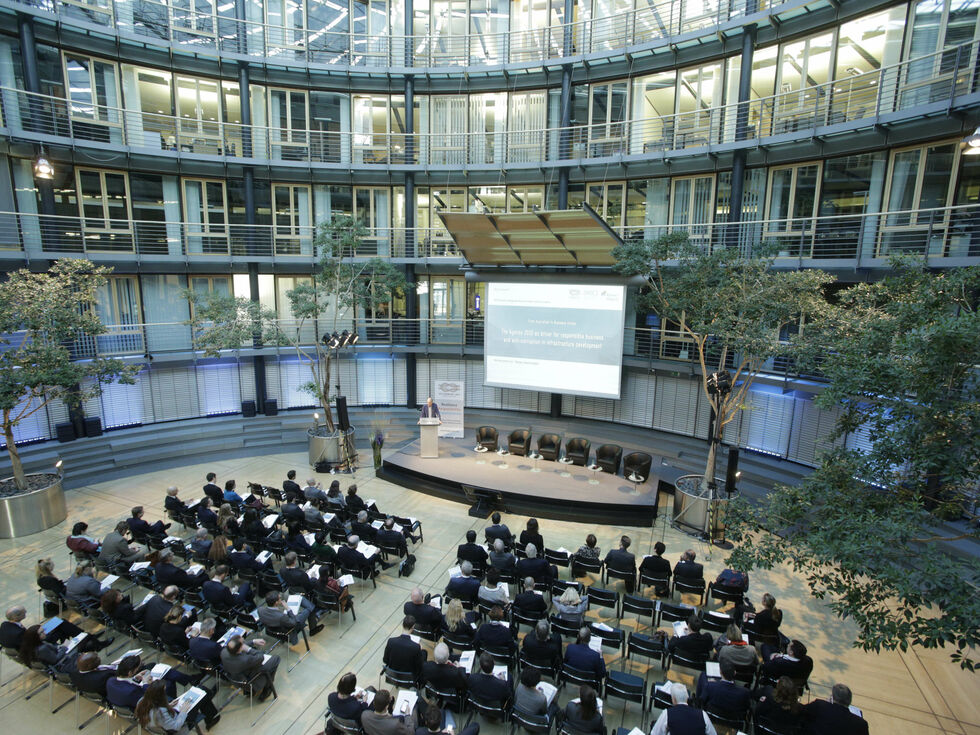How can we ensure a high quality infrastructure development without corruption? – B20 Conference on Responsible Business Conduct and Anti-Corruption
27.01.2017
Berlin, Germany





























The B20 Conference on Responsible Business Conduct and Anti-Corruption “From Aspiration to Business Action: The Agenda 2030 as driver for responsible business and anti-corruption in infrastructure development” organized by the Emerging Market Sustainability Dialogues (EMSD), the Alliance for Integrity and B20 Germany took place on 27 January 2017 at the Allianz Forum in Berlin, Germany.
The conference brought together around 100 key actors from business, government, international organizations, civil society and academia in order to link the Business 20 (B20) debates on infrastructure with the Sustainable Development Goals (SDGs). Infrastructure is one of the key focal areas of the B20 Cross-Thematic Group on Responsible Business Conduct & Anti-Corruption (CTG RBC&AC).
Thomas Silberhorn, Parliamentary State Secretary to the Federal Minister for Economic Cooperation and Development and Jürgen Heraeus, B20 Chairman, opened the conference with high-level statements. Both speakers highlighted the importance of the B20 and the key role of the private sector in achieving progress towards reaching the Sustainable Development Goals and the ambitious targets of the G20. Furthermore, they stressed the timeliness of the conference as a valuable input for the work of the B20 CTG RBC&AC, underlining the increasing importance of the topics on the international agenda.
Roel Nieuwenkamp, Chair of the Working Party on Responsible Business Conduct at the OECD, presented in his key note address the OECD Guidelines for Multinational Enterprises and shared his views on how the B20 can drive the agenda of RBC & AC. The ensuing panel discussion moderated by Brookings analyst Amar Bhattacharya featured input from Stormy-Annika Mildner, B20 Sherpa; Sabine Dall’Omo, Siemens Chief Executive Officer in Southern and Eastern Africa; Edda Müller, Chair of Transparency International Germany; and Astrid Skala-Kuhmann, GIZ Director for the Belt and Road Initiative. The panel agreed that further harmonization of frameworks for RBC and AC can help shape a level-playing-field amongst G20 members and beyond. Furthermore, the panel emphasized that implementation of such frameworks is key.
The opening panel was followed by parallel break-out sessions on the topics of Standards, Certification and Finance in Infrastructure Development and Quality and Anti-Corruption in Infrastructure Development, providing an opportunity for a more focused in-depth discussion.
The session on Standards, Certification and Finance in Infrastructure Development, moderated by EMSD Deputy Director Philipp Kruschel, showcased ideas of leading standard setters for sustainable infrastructure development such as Andreas Georgoulias of Harvard University and Hans-Peter Egler of Global Infrastructure Basel.
With Steven Tebbe of CDP and Sean Gilbert of the World Resources Institute, it also featured representatives of institutions that link investors with implementers in order to provide a more conducive framework for sustainable infrastructure finance. Corinne Lagache of Safran Group and Roel Niewenkamp of the OECD completed the panel sharing their views on the status of implementation of standards, certification and finance for sustainable infrastructure. The break-out session highlighted the achievements in fostering responsible business conduct for sustainable infrastructure and made recommendations to further strengthen related aspects in the recommendations of the B20 CTG RBC & AC.
The break-out session on the topic Quality and Anti-Corruption in Infrastructure Development was moderated by Noor Naqschbandi, Director of the Alliance for Integrity. The experts Tidar Wald, Better Than Cash Alliance; Ana Novik, OECD; Sabine Dall’Omo, Siemens Southern and Eastern Africa; and Alexander Geschonneck, KPMG agreed that infrastructure is a key area for achieving progress on sustainable development and simultaneously highly affected by corruption risks. Strategies such as digitalisation efforts and clean tender processes were featured in the session alongside ideas on how governments can improve their investment policy. The speakers emphasized that collective action between all relevant stakeholders is key to clean infrastructure development.
In the closing panel, moderator Klaus Moosmayer, Chair of the B20 CTG RBC&AC and Chief Compliance Officer at Siemens, debated with representatives of the break-out sessions how responsible business conduct can be implemented in practice and what the private sector can contribute towards achieving sustainable and inclusive economic growth. Dirk Schwenzfeier, German Federal Ministry for Economic Cooperation and Development (BMZ), thanked speakers for the valuable input given throughout the B20 Conference and established links between the B20 agenda and the SDGs.
The conference was followed by an Internal Meeting and discussion of the draft policy paper of the B20 CTG RBC&AC, including the discussion of key findings of the conference.





